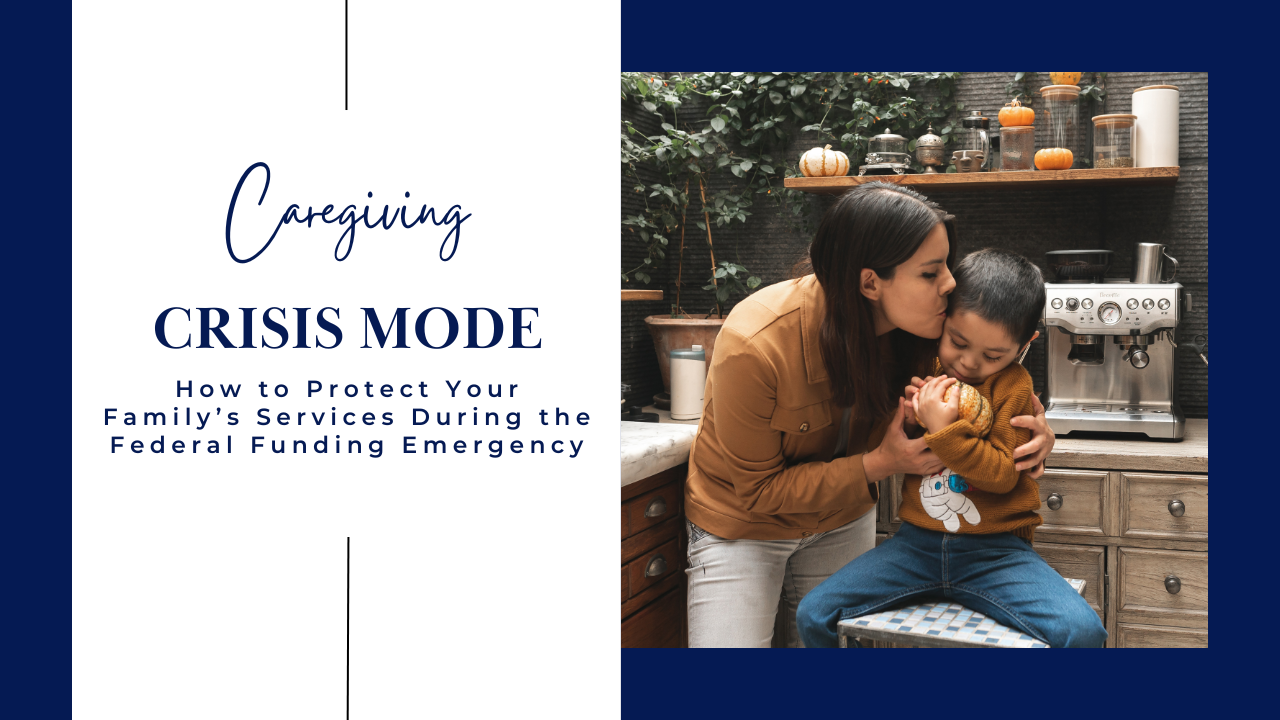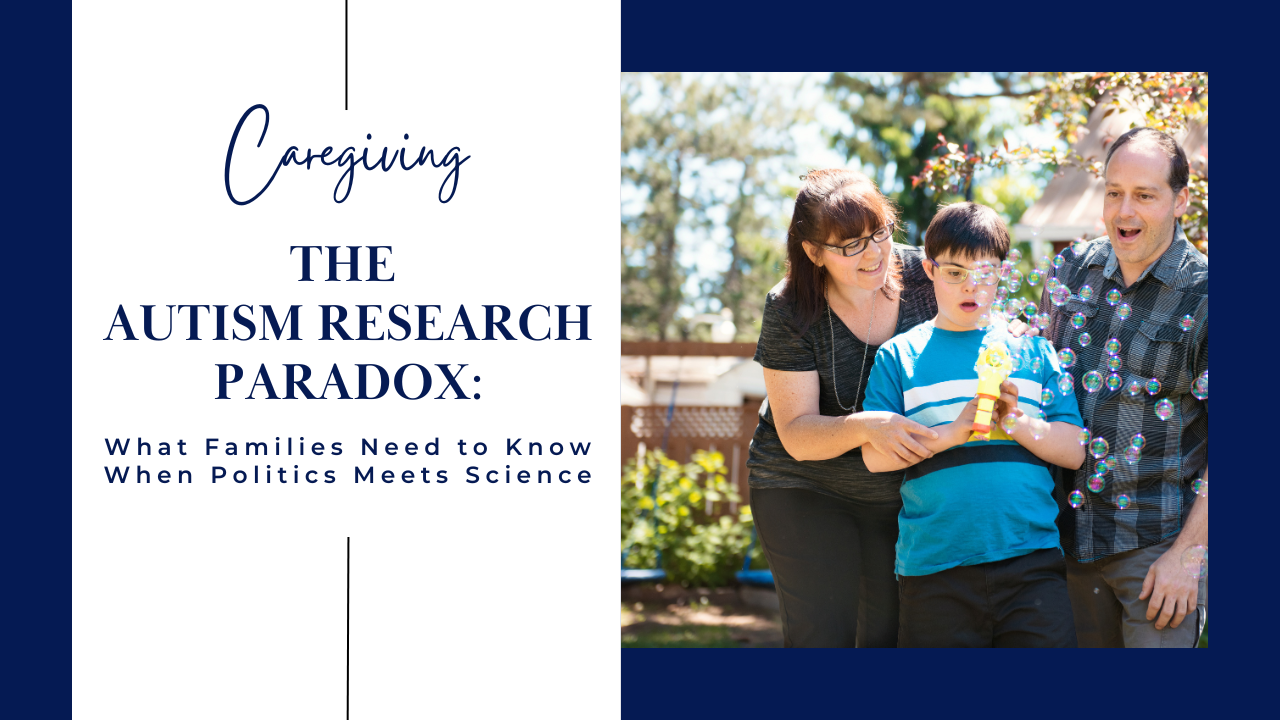Crisis Mode: How to Protect Your Family’s Services During the Federal Funding Emergency
If you’ve been feeling a knot in your stomach lately about news reports mentioning “budget cuts” and “Medicaid reductions,” you’re not alone.
As parents and caregivers of individuals with developmental and intellectual disabilities, we know that behind every policy headline is a real family wondering:
Will my loved one still have the support they need?
Today, we want to have an honest conversation about what’s happening in Washington, what it means for your family, and most importantly, what you can do about it.
The Reality We’re Facing Together
Right now, our community is experiencing what can only be described as a perfect storm.
The current administration has proposed $163 billion in federal spending cuts, with Congress actively considering an additional $880 billion reduction to Medicaid over the next decade.
These aren’t just numbers on a spreadsheet,they represent the backbone of services that families like yours depend on every day.
The immediate impact is already being felt.
Disability advocacy organizations in Mississippi, New Jersey, and Arkansas have announced they’re pausing services or stopping new cases entirely because they’re running out of money.
These are the same organizations that help families navigate school services, investigate abuse and neglect, and provide free legal advocacy.
For many families, they’ve been a lifeline during the most challenging times.
Meanwhile, over 700,000 people with disabilities are already waiting for Medicaid waiver services.
The very programs that provide community-based support, respite care, and the personalized assistance that allows individuals to live with dignity in their communities rather than institutions.
What This Means for Your Daily Life
As someone who has walked alongside families in the Tidewater area for nearly 20 years, we’ve seen how policy changes ripple through to kitchen table conversations.
You might be wondering:
- Will my loved one’s current services continue? The programs currently serving your family are not going to disappear overnight. However, waiting lists may grow longer, and finding new services could become more challenging.
- What about our future plans? If you’ve been working toward getting additional support or transitioning to more independent living arrangements, those timelines may be affected.
- Will quality providers still be available? Funding cuts often lead to staff shortages and program closures, particularly among smaller, community-based providers.
The hardest part? The uncertainty itself.
We know that for families who’ve already been through the exhausting process of finding the right care, the thought of starting over feels overwhelming.
Your Action Plan: Steps You Can Take This Week
While we can’t control what happens in Washington, we can control how we respond.
Here’s what families in our community are doing to protect their services:
Document Everything
This week: Gather all documentation about your loved one’s current services, needs assessments, and any waiting lists you’re on. Having this information organized will be crucial if you need to advocate for continued services or transition to new providers.
Keep records of:
- Current service plans and provider contracts
- Medical evaluations and assessments
- Any improvement or progress your loved one has made
- How services specifically impact their daily life and independence
Connect with Your Representatives
Your voice matters more than you might think. When members of Congress hear from constituents about real-life impacts, it influences their decisions.
Make it personal: Share specific examples of how Medicaid waiver services or other federal programs have impacted your family. Don’t just say “cuts would hurt”.
Explain that “without respite care, I couldn’t work to support our family” or “my child’s community-based support has helped him develop independence skills he couldn’t learn anywhere else.”
Virginia contacts:
- Senator Mark Warner: (757) 441-3079
- Senator Tim Kaine: (757) 518-1674
- Your local House representative (find yours at house.gov)
Strengthen Your Local Network
Now is the time to deepen relationships within your community.
Connect with other families, local disability organizations, and community leaders who understand these challenges.
Consider joining:
- Local parent support groups
- Virginia advocacy organizations
- School district special education advisory committees
- Community boards and councils
Plan for Multiple Scenarios
While staying hopeful, it’s wise to have contingency plans.
This doesn’t mean expecting the worst. It means being prepared so you can focus on what matters most: your loved one’s well-being.
Questions to consider:
- If current services were reduced, what are your family’s highest priorities?
- Are there alternative providers in your area you should research now?
- What informal support (family, friends, community) could you strengthen?
How Community Direct Services Is Responding
Our commitment to you remains unchanged.
For two decades, we’ve weathered economic uncertainties, policy changes, and funding challenges while never wavering in our mission…
Ensuring that individuals with disabilities can maintain their personal dignity and live as productive citizens in our community.
Here’s what we’re doing:
Strengthening Our Foundation: We’ve built our organization to be resilient. Our diversified support and strong community relationships mean we can continue providing quality services even during uncertain times.
Advocating Alongside You: Our leadership team is actively participating in advocacy efforts, working with state and national organizations to protect the services our community needs.
Preparing for Continuity: We’re developing contingency plans to ensure that if families need to transition between providers, that process is as smooth as possible. Our relationships with other quality providers in the region position us to help coordinate care when needed.
Maintaining Quality: Regardless of external pressures, we will not compromise on the person-centered, compassionate care that defines who we are. Your loved one deserves nothing less.
A Message of Hope from Our Family to Yours
We’ve been here before.
In our 20 years serving the Hampton Roads community, we’ve navigated budget crises, policy changes, and economic downturns.
What we’ve learned is this: when families, providers, and communities work together, we find ways not just to survive, but to create something even stronger.
Your loved one’s worth isn’t determined by a budget line item.
Their value, their potential, and their right to live with dignity in the community aren’t up for political debate. They’re fundamental truths that our society, and our Community Direct Services, will continue to uphold.
The disability rights movement has faced challenges before and emerged stronger.
From the fight for the Americans with Disabilities Act to the ongoing push for community integration, our community has consistently shown that when we stand together, we can protect what matters most.
Looking Ahead: What Comes Next
This isn’t the end of the story, it’s a chapter.
While we navigate these immediate challenges, we also want to keep our eyes on the future we’re building together.
In the coming weeks, you can expect:
- Regular updates on policy developments that affect our community
- Opportunities to participate in advocacy efforts
- Resources for strengthening your family’s support network
- Continued, unwavering support from our team
Remember: You didn’t become an expert caregiver overnight, and you won’t lose those skills because of budget negotiations in Washington.
You’ve advocated for your loved one before, built relationships with providers and professionals, and navigated complex systems. Those same strengths will serve you now.
Your Next Steps
If you’re feeling overwhelmed right now, start small:
- This week: Contact one of your representatives’ offices
- This month: Document your loved one’s current services and needs
- Ongoing: Stay connected with other families and your current providers
If you have questions about how these changes might affect your specific situation, don’t hesitate to reach out to our team.
We’re here to help you think through options, connect with resources, and ensure your loved one continues to receive the support they deserve.
Remember: You’re not just a caregiver, you’re an advocate, a community member, and part of the CDS family.
Together, we’ve weathered challenges before, and together, we’ll navigate whatever comes next.
At Community Direct Services, we believe that every person deserves to live with dignity, choice, and community support. For 20 years, we’ve been honored to walk alongside families in the Hampton Roads area through challenges and celebrations alike. That commitment doesn’t change when times get tough, it only grows stronger.
Need support or have questions about how current events might affect your family? Contact our team at (757) 965-4899 or visit communitydirectservices.com. We’re here for you.
Have you taken steps to advocate for your family’s services? Share your experience in the comments below, your story might help another family find their voice.
Sources:
- Disability Scoop. “Nation’s Disability Services System Begins To Buckle As Funding Threats Intensify.” May 19, 2025.
https://www.disabilityscoop.com/2025/05/05/nations-disability-services-system-begins-to-buckle-as-funding-threats-intensify/31439/ - Disability Scoop. “Congress Weighs Drastic Cuts To Medicaid, Disability Services.” May 23, 2025.
https://www.disabilityscoop.com/2025/04/28/congress-weighs-drastic-cuts-to-medicaid-disability-services/31427/ -
KFF Health Policy Research. “Behavioral Health Crisis Response: Findings from a Survey of State Medicaid Programs.” May 25, 2023.
https://www.kff.org/mental-health/issue-brief/behavioral-health-crisis-response-findings-from-a-survey-of-state-medicaid-programs/ -
Kaiser Family Foundation. “A Look at Waiting Lists for Medicaid Home- and Community-Based Services from 2016 to 2024.” October 31, 2024.
https://www.kff.org/medicaid/issue-brief/a-look-at-waiting-lists-for-medicaid-home-and-community-based-services-from-2016-to-2024/





